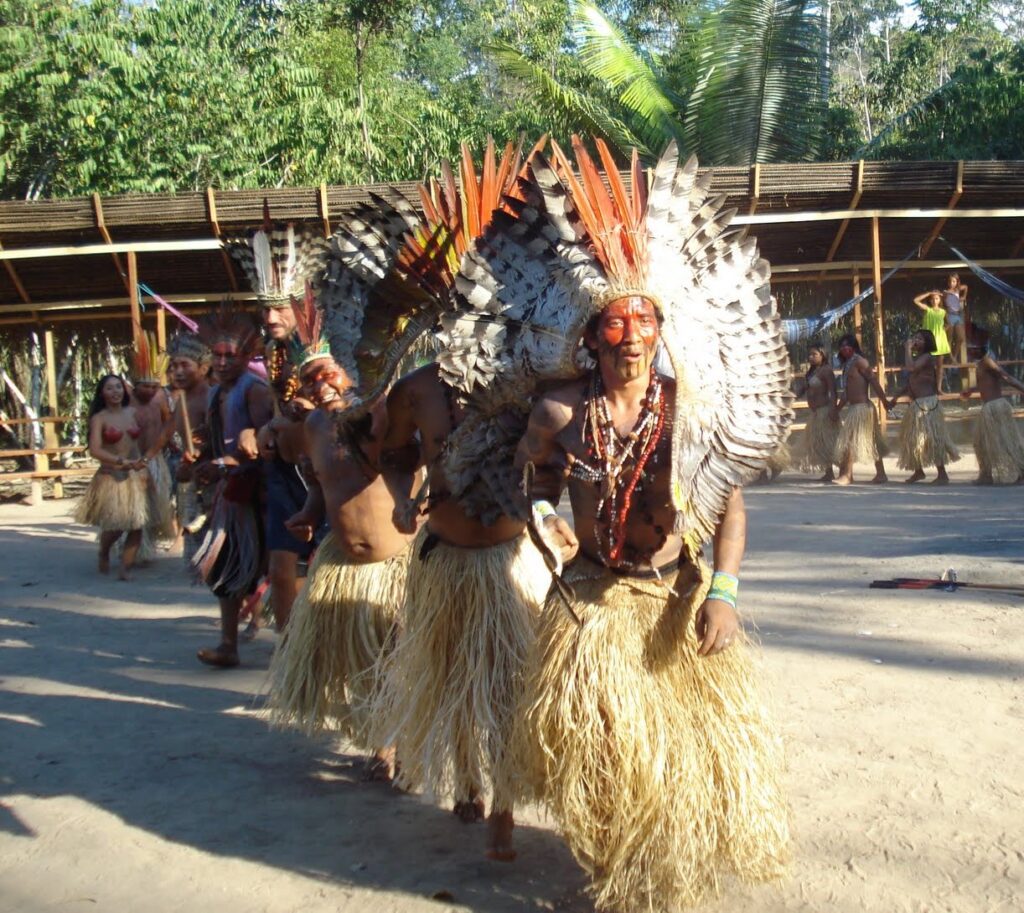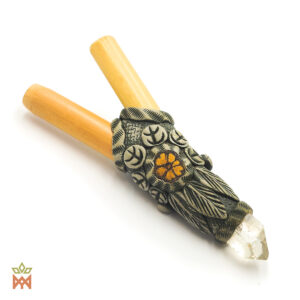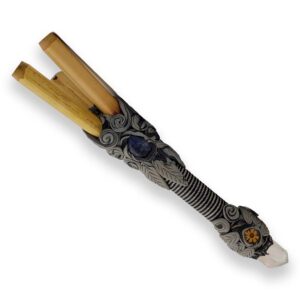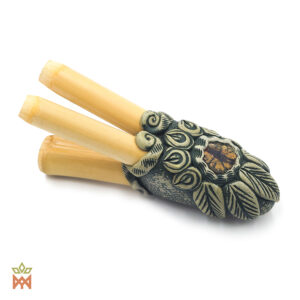Showing 1–12 of 23 results
- € 25,00 Incl. VATSelect options This product has multiple variants. The options may be chosen on the product page
Showing 1–12 of 23 results
Maya and The Kuntanawa tribe
At Maya Herbs, we are honored to have cultivated a long-term, meaningful partnership with the Kuntanawa tribe, an indigenous group located in the state of Acre, Brazil, within the heart of the Amazon rainforest. This partnership is built on trust, respect, and a shared commitment to preserving the ancestral knowledge and cultural heritage of the Kuntanawa people. Our collaboration goes beyond simple trade; it is focused on empowering the tribe through sustainable development and capacity-building, ensuring that their traditions thrive in a rapidly changing world.
We work directly with Milton Kuntanawa, the respected patriarch of the tribe, and several of his sons, including Pedro Univa, Osmildo, and Cidoca, as well as other key members of the Kuntanawa community. Milton, a passionate advocate for the revival of Kuntanawa culture, plays a central role in leading the tribe’s efforts to reclaim their spiritual practices and sacred knowledge after decades of cultural suppression. His sons, following in his footsteps, are committed to passing down the tribe’s wisdom through the crafting of traditional medicines, such as Rapé, and other herbal products. Together, they work to ensure that the Kuntanawa spiritual traditions, especially the use of sacred plants and shamanic practices, are kept alive and shared with the world.

One of the core principles of our partnership is working directly with the tribe—without intermediaries or third parties. This approach ensures that the Kuntanawa maintain full control over the production of their products and that they directly benefit from the sales. The income generated from the sale of Kuntanawa Rapé and other herbal products helps to support the tribe’s economic sustainability, allowing them to invest in their community, protect their land, and continue their traditional way of life. Additionally, this direct relationship allows us to guarantee the highest quality products, as we oversee every step of the process, from harvest to distribution.
When you buy Kuntanawa Rapé and other traditional products from Maya Herbs, you are not only receiving an authentic, ethically-sourced product but also playing an active role in supporting the Kuntanawa tribe. Your purchase directly contributes to the preservation of their culture, the protection of the Amazon rainforest, and the empowerment of indigenous communities. Together, we are helping to ensure that the Kuntanawa people can continue to share their sacred traditions with the world for generations to come.
The Kuntanawa: Guardians of Tradition and Guardians of the Forest
In the heart of the Brazilian Amazon rainforest, nestled amidst the lush green canopy and winding rivers, resides the Kuntanawa family, a vibrant indigenous tribe with a rich history and a profound connection to their ancestral lands. The Kuntanawa, are one of the many indigenous groups that call the Amazon home, and their story is one of resilience, cultural resurgence, and a deep reverence for the natural world.
https://youtu.be/p6LnGbqeftY
History and Resurgence
The history of the Kuntanawa is a testament to their strength and perseverance in the face of adversity. Like many indigenous communities, they have faced centuries of colonization, exploitation, and marginalization, which threatened to erase their traditions and way of life. However, despite these challenges, the Kuntanawa have managed to survive and thrive, thanks to their unwavering commitment to preserving their culture and protecting their ancestral lands.
In recent decades, there has been a resurgence of interest in indigenous rights and cultural heritage in Brazil, leading to a renewed sense of pride and identity among the Kuntanawa people. Today, they are reclaiming their place as guardians of the forest and custodians of their traditional knowledge, which has been passed down through generations.
Living in Harmony with Nature
The Kuntanawa have a deep spiritual connection to the natural world, viewing the forest as a sacred and interconnected web of life. They believe that every plant, animal, and river has its own spirit, or “yuxin,” which must be respected and honored. This worldview guides their way of life, influencing everything from their daily activities to their spiritual practices.
For the Kuntanawa, living in harmony with nature means practicing sustainable land management and traditional hunting and gathering techniques. They rely on the forest for food, medicine, and shelter, using ancient knowledge passed down from their ancestors to sustain themselves and their communities.
Ayahuasca and Rapé: Sacred Medicines of the Forest
Central to Kuntanawa spirituality are the sacred plant medicines of ayahuasca and rapé. Ayahuasca, also known as the “vine of the soul,” is a powerful psychedelic brew made from the Banisteriopsis caapi vine and other plants. It is used in traditional ceremonies to induce spiritual visions, heal the body and mind, and connect with the spiritual realm.
Rapé, on the other hand, is a sacred snuff made from a mixture of tobacco and other plant materials. It is blown into the nostrils using a special pipe and is believed to have cleansing and grounding properties. The Kuntanawa use rapé in rituals and ceremonies to clear negative energies, enhance focus and concentration, and deepen their connection to the natural world.
Both ayahuasca and rapé play a central role in Kuntanawa shamanism, serving as tools for spiritual growth, healing, and communion with the divine. They are used in ceremonies led by shamans, or “pajés,” who act as intermediaries between the human and spirit worlds, guiding participants on journeys of self-discovery and transformation.
Kuntanawa Rapé
Kuntanawa Rapé, a deeply revered ceremonial snuff, is used by the Kuntanawa tribe from the Amazon basin, distinguished by its potent spiritual properties. Crafted through traditional methods, this sacred blend incorporates a diverse array of medicinal plants and ashes. Each formulation is designed to facilitate spiritual cleansing, grounding, and heightened awareness, catering to various spiritual and physical well-being needs. The Kuntanawa Rapé is celebrated for its specific uses and intentions, enhancing meditation, promoting healing, and deepening connections with the natural world. Popular varieties such as Heart of the Boa, Yunu, and Bee Power with Propolis, along with Força, Samauma Flower, and Jarina, reflect the tribe's extensive ethnobotanical knowledge. Each variety is uniquely formulated to meet the specific spiritual or health-related needs of its users, making every experience profoundly impactful. Through these diverse offerings, Kuntanawa Rapé acts as a conduit to the tribe’s ancestral wisdom and sacred rituals, providing a glimpse into their rich spiritual heritage to users worldwide.
Where They Live
The Kuntanawa primarily inhabit the state of Acre in western Brazil, where they live in small villages scattered throughout the rainforest. Their communities are often located along rivers or near clearings in the forest, allowing them easy access to water and resources. The Kuntanawa are intimately connected to their land, which they consider sacred and imbued with spiritual significance.
In recent years, the Kuntanawa have become increasingly involved in environmental conservation and sustainable development initiatives, working to protect their ancestral lands from deforestation, mining, and other threats. They recognize that the health of the forest is intricately linked to their own well-being and are committed to preserving it for future generations.
Buy Kuntanawa Rapé
In conclusion, the Kuntanawa are a resilient and spiritually rich indigenous tribe with a deep reverence for the natural world. Their history is one of survival and cultural resurgence, and their traditions are rooted in a profound connection to the forest and its inhabitants. Through their use of sacred plant medicines like ayahuasca and rapé, the Kuntanawa continue to seek healing, guidance, and spiritual growth, honouring the ancient wisdom of their ancestors while embracing the challenges of the modern world.













